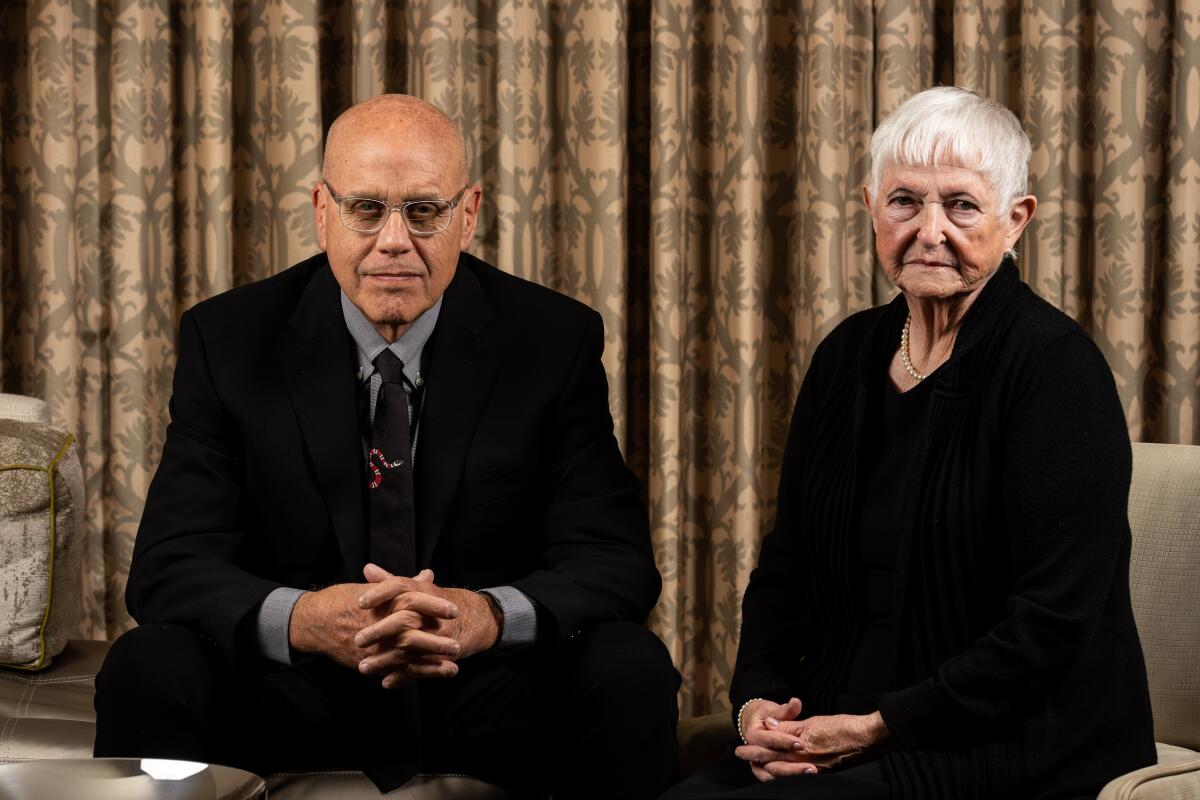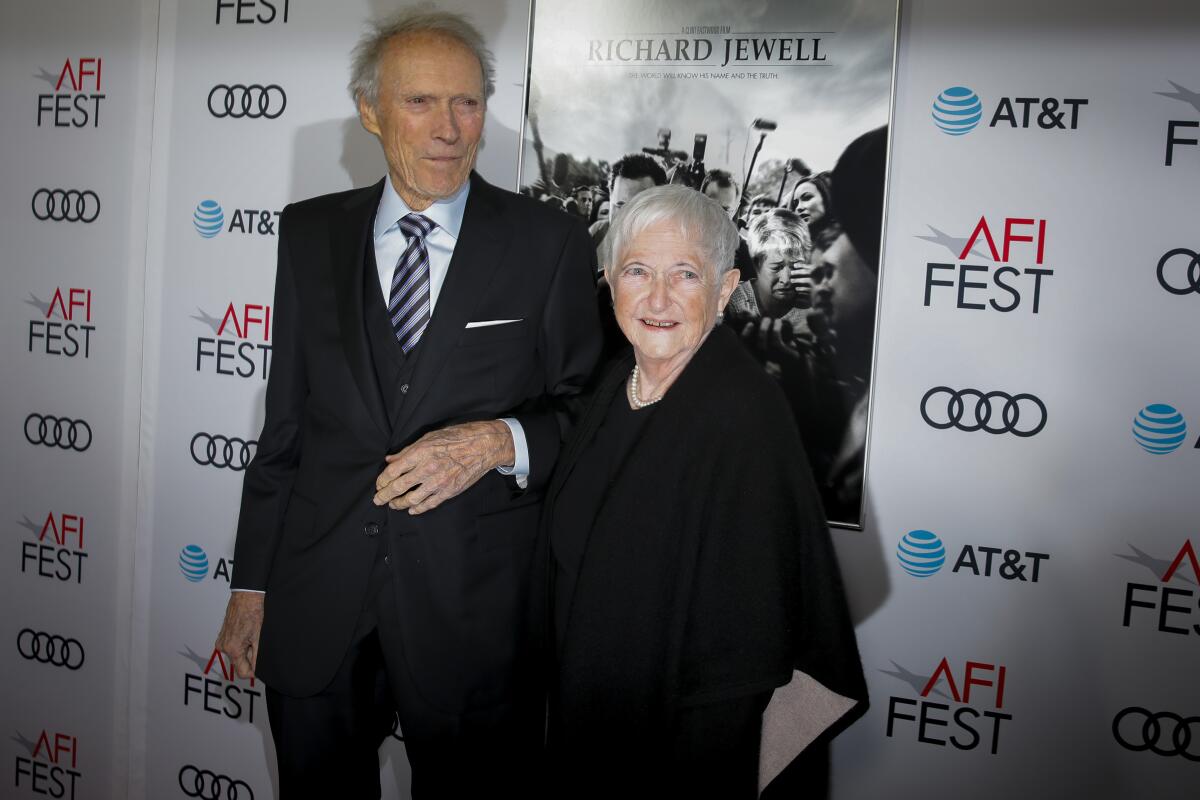For Richard Jewell’s mother and lawyer, Clint Eastwood’s new film brings both pain and healing

Richard Jewell loved movies, particularly anything with John Wayne or Clint Eastwood. Living with his mother, Bobi, in her Atlanta apartment, Jewell, who worked as a security guard, would sometimes tell her when there was a film he thought she’d like so they could watch it together.
“His schedule was iffy — he was gone at night most of the time — but if there was a good one he’d let me know about it and we’d watch it,” Bobi Jewell recalls by phone from Atlanta on an early-December morning. She pauses. “He loved his loud music, and the people in the apartment above were elderly and they used to bang on the wall. But other than that, he was a good kid.”
Back then, Bobi Jewell never could have imagined that Eastwood would one day direct a film about her son: the drama “Richard Jewell,” which is now in theaters. She never could have imagined that she would bake her famous pound cake for one of Richard’s biggest heroes and walk a red carpet at a glitzy premiere with Eastwood, holding his hand. But then again, before that terrible summer of 1996, she never could have imagined that there would even be a story to tell.

On July 27, 1996, a week into the Summer Olympics in Atlanta, Richard Jewell was working security at a nighttime concert in the city’s Centennial Park when he noticed a suspicious backpack underneath a bench and alerted the police. A bomb squad was called in and, as Jewell and other security and law enforcement personnel worked to evacuate people from the area, an explosive device in the backpack detonated. One person was killed and 111 were injured — a casualty count that surely would have been much higher had Jewell not discovered the bomb and helped move concertgoers to safety.
Initially, Jewell was hailed as a hero. But just three days later, the Atlanta Journal-Constitution reported that the FBI was treating him as a possible suspect, under the theory that the security guard, disgruntled over a career that hadn’t panned out the way he’d hoped, might have planted the bomb so he could then “discover” it and be celebrated for saving lives. Over the next three months, Jewell and his mother became virtual prisoners in Bobi’s apartment as the FBI kept him under constant surveillance and the media depicted him as the presumed culprit.
Even after his name was cleared with the help of a lawyer named Watson Bryant — even after domestic terrorist Eric Rudolph pleaded guilty to the Centennial Park bombing and three other attacks in 2005 — the ordeal would hover over Jewell until his death in 2007 at age 44 of heart failure from complications of diabetes. It still haunts his mother to this day.
Bobi Jewell says she’s grateful that Eastwood has made that ordeal the subject of his latest film — with Paul Walter Hauser as Richard, Kathy Bates as Bobi and Sam Rockwell as Bryant — and that those who may have only vague memories, if any, of the bombing and its aftermath will know that her son really was a hero. “That’s what I want people to know, instead of what we have had to contend with,” she says, her voice breaking. “I just want the world to know what can happen to a little old lady. I was 60-something when it happened and I’m 83 now. So life goes on.”
Their bonds forged in that media and legal firestorm, Bryant and the Jewells remained close; for a time, Bobi even babysat for the lawyer’s two children. Bryant hopes “Richard Jewell” will finally erase any lingering doubts about Jewell’s role in the bombing.
“Look, to this day I run into people and when you say Richard Jewell, they say, ‘Oh, he’s the guy that got off,’” says Bryant, who is still outraged at the way Jewell’s reputation was tarnished. “These bums [in the FBI] never had enough to arrest him — they had nothing but a bunch of BS taken out of context that they used to frame him up for a story that was too good to be true. Yet to this day people think he had something ugly to do with the bombing — when he’s the guy that, but for him, it would have been raining body parts when that bomb went off. I can’t imagine how many people are alive today and how many kids have been born just because Richard did his job.”
When first approached about starring in “Richard Jewell,” both Rockwell and Bates were largely unfamiliar with the story of the Centennial Park bombing, which neither had followed closely at the time. “I just remember Muhammad Ali with the torch [at the Atlanta Olympics’ opening ceremonies] and crying like a baby at that,” Rockwell says. But after meeting Bryant and Bobi Jewell, they quickly came to understand how profoundly they and Richard had been impacted by those three months and the years of litigation and other aftershocks that followed. (NBC News, CNN and the New York Post eventually settled lawsuits filed by Jewell.)
“I met Bobi when I went down to shoot in Atlanta and we spent quite a few hours together,” says Bates, who has earned a Golden Globe nomination for supporting actress for her performance. “Even after all these years, it’s still really raw for her and she teared up quite a few times as she told me some anecdotes: how they were supported by their church but prevented from seeing them and how Richard was prevented from going to visit a friend when he was dying. It was just devastating. You don’t realize when you throw a grenade in a foxhole like that that you’re going to have so much collateral damage.”
A late arrival in this year’s awards season, “Richard Jewell” has earned generally positive reviews and a measure of Oscar buzz but has also drawn its share of controversy. Given Eastwood’s well-known conservative leanings, some have viewed the film through a political lens, seeing it as a kind of Trump-friendly broadside against two of the president’s most frequent targets, the FBI and the news media. Meanwhile, the Atlanta Journal-Constitution has criticized the movie over its portrayal of the late reporter Kathy Scruggs, played by Olivia Wilde, saying it falsely depicts her as trading sex for information and demanding a disclaimer. (The paper spent years fighting a lawsuit brought by Jewell and, in 2011, the Georgia Court of Appeals ruled in its favor.)
In response to the paper’s charges, Warner Bros. issued a statement earlier this week calling the claims “baseless” and saying, in part, “It is unfortunate and the ultimate irony that the Atlanta Journal-Constitution, having been a part of the rush to judgment of Richard Jewell, is now trying to malign our filmmakers and cast.” Eastwood was unavailable to comment for this story.

For his part, Rockwell says he doesn’t see the film in political terms at all. “I think it’s an old-fashioned melodrama about injustice,” he says. “It’s like a John Grisham novel or Arthur Miller’s ‘The Crucible,’ or ‘Philadelphia’ or ‘A Few Good Men.’ They don’t really make movies like this anymore. I don’t know if they’ll make them at all in 10 years.”
Bates says she can see how Jewell’s story can be regarded as a clear-cut indictment of law enforcement and media overreach, but she hopes the audience for the film takes a more nuanced view.
“The government got it wrong and the media got it wrong, but I don’t want people to come away from this movie kicking dust on those institutions because now more than ever we need the press to be truthful with us,” Bates says. “They wanted to solve the case quickly and not lose all that money on the Olympics, and Kathy Scruggs, she really wanted the right story. They were all so passionate about trying to do their jobs, and you can’t fault them for that specifically. It’s a cautionary tale. I think we all need to slow the ... down and really think things through.”
At a time of intense polarization, how the wider audience will receive “Richard Jewell” remains to be seen. But it won’t hit anyone in quite the same way that it does Bryant and Bobi Jewell.
“We had this profound sense of loss when the movie was over,” Bryant says. “Paul is so good [as Jewell] that Richard was back for a couple of hours — and then he’s gone again.”
“Just Mercy,” “Richard Jewell,” “The Irishman” and “Little Women” are among eight memorable books that made the leap to film in 2019.
“I told Bobi I thought that Richard was orchestrating this whole thing from the other side,” he continues. “The big tragedy is that he’s not here, because he would so get off on a Clint Eastwood movie where he got to be with him and all this other stuff. He would be as happy as he could be. The next best thing is for Bobi to get there. One of the best things I’ve ever seen is this video clip of Bobi on the red carpet with Clint Eastwood, looking up into his face and smiling. After all this poor woman has been through over the years, to have such joy for a while is priceless.”
To this day, Bobi Jewell isn’t totally sure how her son processed the experience of being publicly vilified for something he hadn’t done, of being turned overnight from a national hero to a purported glory-chasing criminal. Through it all, he didn’t talk much about his feelings because he didn’t want to add to her worries.
“He lived with it,” she says quietly. “There was a lot I didn’t know because he wouldn’t tell me. ... I think the children now will know what Richard went through. Let’s hope it doesn’t happen to anybody else.”
More to Read
Only good movies
Get the Indie Focus newsletter, Mark Olsen's weekly guide to the world of cinema.
You may occasionally receive promotional content from the Los Angeles Times.












